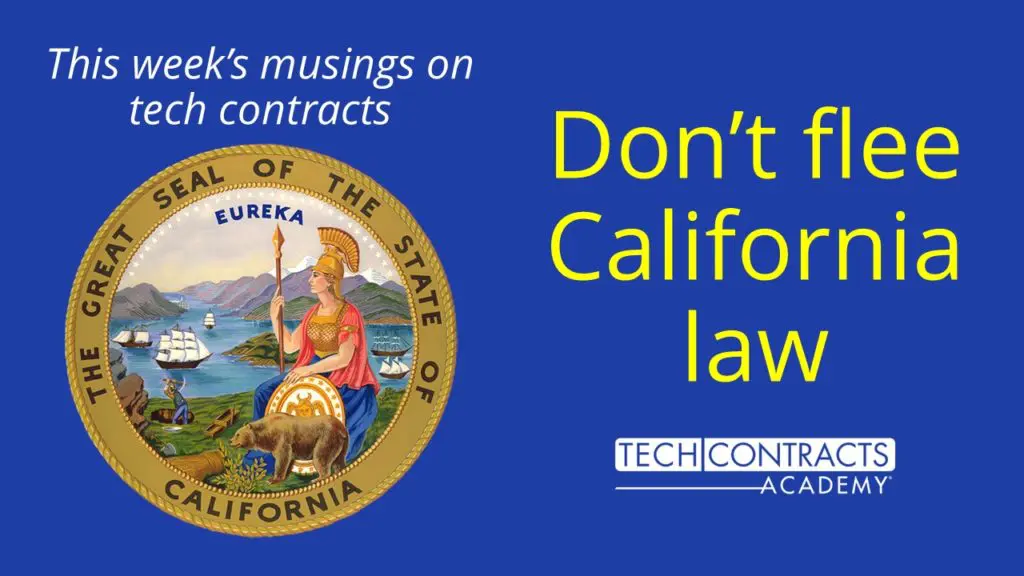This week’s musings on tech contracts…
Some companies and contract-drafters refuse California for their choice of law terms. I’ve even run into legal department policies saying, “any state but California.” In most IT contracts, that’s a mistake: the result of myth and misunderstanding.
Full disclosure: I’m a California lawyer. But it’s still true …

California Employment and Consumer Protection Laws
Anti-California drafters and companies worry that the state has business-unfriendly laws. They also imagine that California has unusual laws. In fact, one highly qualified lawyer – who’d negotiated deals all over the country – told me he’d have no idea how to interpret a California contract. (Are you kidding? He agreed to California law in the end.)
The business-unfriendly fear results mostly from California laws protecting employees and consumer rights. California frequently leads the nation in establishing new protections for employees and consumers. Those laws, however, play no role in B2B contracts. And if they do apply to your B2B or B2C deal, you can’t avoid them through contract terms.
You might think choosing California law for a B2B deal could mean its laws apply to your transactions with employees or consumers. You’d be wrong. You can’t decide which state’s laws protect your employees through a choice of law clause. The laws of the employees’ workplace will protect them. So if your employees don’t work in California, its laws won’t govern your relationship, regardless of the choice of law in your IT contracts. And if employees do work in California, you can’t use IT contract terms to avoid CA law.
The same goes for consumer laws. State consumer protection laws protect that state’s consumers, even if you choose another state’s laws in your B2C contracts. (That’s the case for all states, not just California.) So choosing or avoiding CA law in your contract won’t impact application of consumer protection laws.
California Law Advantages
California law, in fact, has serious advantages. The Golden State is the nation’s biggest, which means it has the most case law. And more case law means more clarity: more predictable outcomes and less time-consuming and expensive litigation. California is also home to the Silicon Valley, which means it has a disproportionately large share of tech companies. That means yet more caselaw specific to IT, providing even greater certainty.
Big tech companies like Google, OpenAI, Apple, Salesforce, and many, many others choose California law for their B2C and B2B contracts (along with California courts). They could choose other states, since they operate almost everywhere. They don’t because they know what they’re doing.
Keep it Simple
Predicting the best laws for your deal isn’t easy. Once in a while, you have a strong reason to choose one state’s laws over another’s, based on some legal principle likely to matter. But in most cases, you don’t know what issues will arise. So even if you’ve done a ton of homework on the merits of various states’ laws, you probably won’t know in advance which laws would serve you best.
If in doubt, just keep it simple. Choose the laws of the jurisdiction where you work – and choose that jurisdiction’s courts too. Of if the parties come from different jurisdictions, arm-wrestle, horse-trade, or otherwise find a way to pick one. Or just pick the jurisdiction where most work will take place. And don’t flee California unless you have a very good reason, supported by a lot of research.
For more on choice of law, see The Tech Contracts Master Class™, which covers choice of law in course 4.
© 2025 by Tech Contracts Academy, LLC
